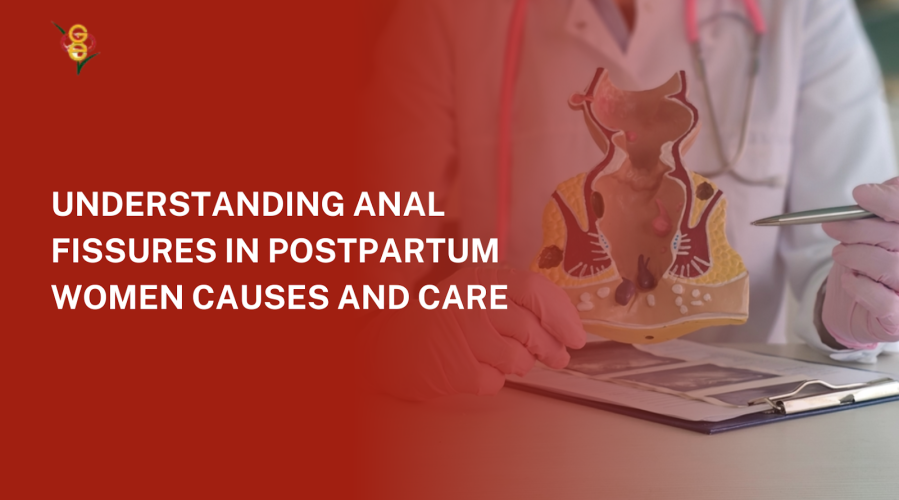Learn what gallstones are, their common symptoms, causes, and treatment options. Discover when to seek medical care and how to manage gallstone complications effectively.
Understanding Anal Fissures in Postpartum Women: Causes and Care

Having a new baby is such a beautiful thing, but what follows after is not always rosy. Anal fissures are another problem that many new mothers experience. These are small tears in the lining of the anal canal and can lead to discomfort, pain and even bleed when passing stool. Knowledge of what leads to formation of anal fissures, the signs to expect and how to manage them is crucial for a better healing process.
What Are Anal Fissures?
An anal fissure is a break or tear in the mucosa, the thin, red, and shiny lining of the anus. This condition is normal in all adults but more so in postpartum women because of the stress involved when delivering a baby and changes in bowel habits after birth. Anal fissures are not very serious in most cases, but they can be painful if not treated properly.
Common Causes of Anal Fissures in Postpartum Women
- Straining During Childbirth: Vaginal delivery involves considerable pressure that may pull apart the anus or its surrounding skin.
- Constipation: It is painful to defecate after birth since most postpartum women suffer from constipation caused by hormonal changes or lack of exercise or water intake.
- Hemorrhoids: If the woman has hemorrhoids during or after pregnancy, the risk of developing fissures will be even higher.
- Tissue Sensitivity: After childbirth, the hormonal content in a woman’s body changes, and the anal mucosa becomes more susceptible to micro-injuries.
Symptoms of Anal Fissures
It is therefore important to know the signs so as to get the right treatment. Symptoms of anal fissures include:
- Stabbing pain at the time of defecation and after it.
- Stool or toilet paper that is bright red or has streaks of bright red in it.
- Itching or burning sensation around the anus.
- A small opening of the skin around the anus that can be easily seen.
- A feeling or contraction of the anal muscles.
Effective Care and Fissure Treatment
Anal fissures are best handled through home care measures together with diet modification and at times drugs or surgery. Here are some care tips and fissure treatment options:
1. Home Remedies
- Warm Sitz Baths: It is recommended to sit in warm water for 15-20 minutes several times a day that will help to relieve pain and promote the healing process.
- Hydration: Staying hydrated also decreases the chances of having more tears as the water softens the stool.
- Fiber-Rich Diet: To avoid constipation, ensure that you take a lot of fruits, vegetables and whole grain products.
2. Medical Treatments
- Topical Creams: Ointments with hydrocortisone or pain relief agents can ease discomfort.
- Fissure Treatment Procedures: In severe cases where fissures do not heal with home care, your doctor may recommend minor surgical interventions to promote healing.
- Specialist Care: If symptoms persist, seeking help from a specialist, like those at GEM Hospital, ensures access to advanced treatments and compassionate care. For severe cases, fissure surgery in Coimbatore is available for effective management.
Preventing Anal Fissures Postpartum
While some causes of anal fissures are unavoidable, there are steps you can take to reduce your risk:
- Stay Active: Hydrocortisone or pain relieving ointments may be applied to reduce the pain.
- Follow a Balanced Diet: If fissures do not heal through home remedies, your doctor may advise on minor surgery to facilitate the healing process.
- Avoid Straining: Listen to your body and avoid forcing bowel movements.
- Seek Early Care: When the symptoms do not disappear, consulting a specialist which includes those at GEM Hospital guarantees the patient better treatment.
Connection Between Anal Fissures and Other Postpartum Conditions
Recovery after childbirth requires intervention in a number of areas of the woman’s health. Some of the problems that are prevalent in new mothers include hernia treatment in Coimbatore and other problems of the pelvic floor. Any sign that may hinder your general health after birth should be discussed with a medical practitioner.
When to See a Doctor
Although most anal fissures are treatable at home, some may need medical intervention. Consult a doctor if:
- Symptoms last for greater than 6 weeks.
- Pain is said to worsen or become chronic.
- You experience any alteration in bowel movement or the texture of stools.
- It is a recurrent bloody stool.
Postpartum women can develop anal fissures and they are not very comfortable but they can be managed. Therefore, when new mothers know the causes of some complications, are able to identify the early signs and follow the correct caring procedures, they can easily heal comfortably. For chronic pain or any other pain-related issue, or if you require professional advice, contact GEM Hospital. Their team is committed to attending to all your postpartum health issues and offering fissure treatment among other concerns.
Blogs & Article
Learn about bloating and gas problems, including common causes, symptoms, and effective solutions to improve digestion, reduce discomfort, and maintain gut health.
Learn how unverified Ayurveda treatments may cause liver damage, understand the risks, symptoms, and why medical guidance is essential for safe care.


